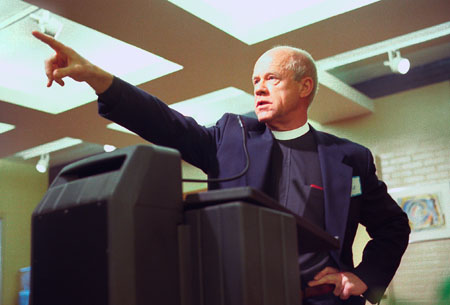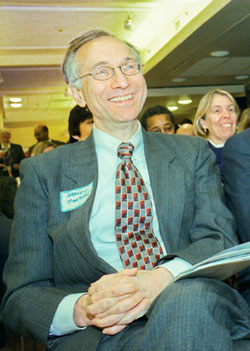‘Partnership’ ensures shelter’s future

Harvard students and officials joined representatives of the University Lutheran Church, the city of Cambridge, and a community development organization at a ceremony in the church basement on Wednesday, Jan. 10, to mark the end of renovations to the student-run homeless shelter there.
Though the renovated shelter, called the Harvard Square Homeless Shelter, was open for business last winter, the project wasn’t officially complete until long-term financing was arranged. That financing, done through the community development organization Boston Community Capital, was completed last month.
“I think the word is ‘partnership.’ Partnership is absolutely critical,” said the Rev. Thomas Chittick, pastor of the University Lutheran Church and member of the United Ministry at Harvard.
Harvard itself helped support the partnership. DeWitt Jones, president of Boston Community Capital’s Boston Community Loan Fund, which provided the financing, said Harvard’s 20/20/2000 program was responsible for critical backing that allowed the fund to make the loan.
The 20/20/2000 program, announced in November 1999, is a 20-year program that provides $20 million in low-interest loans to community agencies to support affordable housing in Harvard’s host cities of Boston and Cambridge.
Boston Community Capital received $4 million in 20/20/2000 funds, which convinced other large lenders to make more money available. The structure of the 20/20/2000 program allows the Harvard dollars to be used again and again, greatly magnifying the benefit. In the last year alone, Harvard’s $4 million investment in the Loan Fund has led to $10 million worth of affordable housing projects, Jones said.
The Harvard Square Homeless Shelter renovation cost $385,000. It was initially financed by temporary loans and support from the University Lutheran Church community. The permanent financing provides a five-year loan at 7 percent interest.
Jones praised the University Lutheran Church for hosting the shelter and Harvard University for making the financing available, saying both have taken a leadership role in addressing the housing needs of the area’s poorest residents.

Harvard Provost Harvey V. Fineberg praised the work of the students who run the shelter, saying that the physical renovation is just a small part of what happens there. He said the University’s small role in the endeavor, was “gratifying and humbling.”
“The physical renovation is nothing compared to the spiritual work that goes on in this space,” Fineberg said. “This is what a complete education is about.”
Fineberg was joined at the ceremony by Cambridge Mayor Anthony Galluccio, state Rep. Alice Wolf, who represents the district containing the church, and other University and city officials.
By all accounts, the renovation itself was a resounding success. From an unfinished church basement – with a single shower shared by the 22 shelter residents – the shelter today is an airy space, lit by recessed track lighting. A line of tall black metal cabinets cordons off the sleeping space, filled with bunk beds and the bags of shelter residents, who are not allowed to stay in the shelter during the day.
In addition to other changes, the renovations enlarged and upgraded the rest rooms, providing two showers each for men and women. A handicapped ramp was also added.
“I’m not sure I’d really recognize the area,” Alina Das, a Harvard senior who is the shelter’s volunteer director, said of the change.
The shelter, established in 1983, was originally thought to be filling a temporary need, one that would last until society recognized and dealt with its homeless problem. That attitude persisted, Das said, and was reflected in the set up of the space before the renovation – essentially cots and temporary furnishings in the church basement.
This winter, the shelter has been full most nights, Das said, adding that they’ve often had to call other shelters to find space for people looking to get in out of the cold.
“We’ve been full every night,” Das said. “What’s even worse is we make referrals to other shelters when we’re full, and they’re full as well.”
Das said no one is turned away on a cold night, but when the shelters are full, accommodations may be a blanket on the floor.
The shelter is the only student-run shelter in the country. It is entirely staffed by Harvard students, with two students working overnight each night to handle any problems that might arise.
“I have learned more about humanity and life within these walls than I have learned anywhere else,” Das said. “For students, the shelter is more than a place to stay … most important, we try to foster a sense of dignity.”




